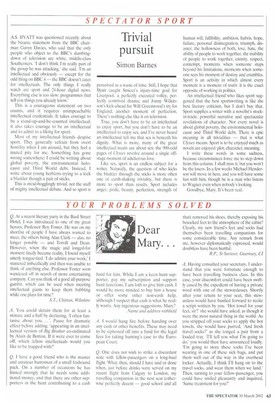Trivial pursuit
Simon Barnes
A.S. BYATT was questioned recently about the bizarre statement from the BBC chairman Gavyn Davies, who said that the only people who object to the BBC's dumbingdown of television are white, middle-class Southerners. 'I don't think Pm really part of the group he was attacking,' she said. 'I'm an intellectual and obviously — except for the odd thing on BBC 4— the BBC doesn't cater for intellectuals. The only things I really watch are sport and 24-hour digital news. Everything else is too slow: programmes that tell you things you already know?
This is a courageous statement on two counts, and it requires unimpeachable intellectual credentials. It takes courage to be a stand-up-and-be-counted intellectual; it also takes courage to be an intellectual and to admit to a liking for sport.
Most of my intellectual friends despise sport. They generally refrain from overt hostility when I am around, but they feel a muted pity for me. Something has gone wrong somewhere: I could be writing about global poverty, the environmental holocaust and Third World debt. Instead, I write about young herberts trying to a kick a bladder though a pair of sticks.
This is mind-bogglingly trivial, not the stuff of mighty intellectual debate. And so sport is perceived as a waste of time. Still, I hope that Byatt caught Smicer's injwy-time goal for Liverpool. a perfectly executed volley, perfectly contrived drama; and Jonny Wilkinson's kick-ahead for Will Greenwood's try for England, another moment of perfection. There's nothing else like it on television.
True, you don't have to be an intellectual to enjoy sport, but you don't have to be an intellectual to enjoy sex, and I've never heard an intellectual tell me that sex is beneath his dignity. What is more, many of the great intellectual treats are about sex: the 900-odd pages of Ulysses revolve around a single offstage moment of adulterous love.
Like sex, sport is an endless subject for a writer. Naturally, the question of who kicks the bladder through the sticks is more often one of earth-shaking triviality, but there is more to sport than results. Sport includes anger, pride, beauty, perfection, strength of human will, fallibility, ambition, hubris, hope, failure, personal disintegration, triumph, disaster, the hollowness of both, love, hate, the ability of people to work together, the inability of people to work together, enmity, respect, contempt, moments when someone steps beyond his limitations, moments when someone sees his moment of destiny and crumbles. Sport is an activity in which almost every moment is a moment of truth: it is the exact opposite of working in politics.
An intellectual friend who likes sport suggested that the best sport.swriting is like the best literary criticism, but I don't buy that. Sport supplies a writer with a novelist's stockin-trade: powerful narrative and spectacular revelations of character. Not every novel is about global poverty, the environmental holocaust and Third World debt. There is epic meaning in all trivialities — that is what Ulysses means. Sport is to be enjoyed much as novels are enjoyed: plot, character, meaning.
I write these words in some sadness, because circumstances force me to step down from this column. I shall miss it, but you won't be the losers. In a few weeks Michael Henderson will move in here, and you will have some fun with him, though he is a man who listens to Wagner even when nobody's looking.
Goodbye, Mary. It's been real.


































































 Previous page
Previous page